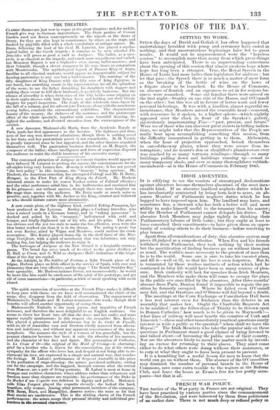IRISH ABSENTEES.
IT is edifying to see the venders of stereotyped declamations against absentees become themselves absentees of the most inex- cusable kind. If an absentee landlord neglects duties which he has involuntarily contracted by being born heir to acres, an ab- sentee Member of Parliament neglects duties which he has begged to have imposed upon him. The landlord may have, and sometimes has, a steward who has both a better will and more ability to make himself useful to the tenantry than his master; but the Member of Parliament cannot delegate his duties. The absentee Irish Members may judge rightly in thinking their Parliamentary labours of little value; but they ought at least to have consulted their constituents—to have given them an oppor- tunity of sending others to do their business—before resolving to play truant.
Apart from all considerations of duty, this absentee system may prove ill-judged as a coup-de-theatre. When Fox and his friends withdrew from Parliament, they took nothing by their motion but the mortification of finding business go on without them just as usual. The world is more necessary to the greatest of men than he is to the world. Some one is sure to take his vacated place, and fill it—well or ill, so that his loss is soon forgotten. But he is tormented by those restless instincts of action which had he continued in busy life would have been so many sources of plea- sure. Irish curiosity will look for speeches from Irish Members, and the Members who make them will come to occupy the place in the public eye once filled by the absentees. After three months' absence from Paris, Danton found it impossible to regain the po- sition be formerly occupied. Where he failed even O'Connell may fail, and the Grattans and O'Briens will fail beyond a doubt. The meetings at the Corn Exchange or Conciliation Hall have a less real interest even for Irishmen than the debates in an assembly that makes law. Ought the Charitable Bequests Act to be modified ? are the fellowships of Trinity to be thrown open to Roman Catholics ? how much is to be given to Maynooth ?- what lines of railway will most benefit the counties of Cork and Limerick ?—these and other immediately practical questions surely interest as wide a public as the question" when shall we have the Repeal?" The Irish Members who take the popular side on these questions in Parliament stand a good chance of being listened to and talked about—of becoming the public men of their country. Nor are the absentees likely to mend the matter much by invent- ing an excuse for returning to their places. They must come either to do what others were doing without their assistance, or to carp at what they ought to have been present to prevent. It is a humbling but a useful lesson for men to learn that the world can go on without them. The absence of the O'Connellites may dimimsh the number of personal brawls in the House of Commons save some extra trouble to the waiters at the Reform Club, and leave the boxes at Evans's free for less portly occu- pants—but that is all.


























 Previous page
Previous page